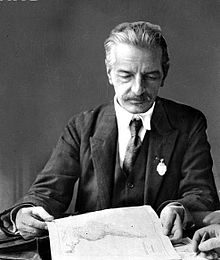Prominent Poles
Eugeniusz Mikołaj Romer, geographer, cartographer and geopolitician, whose maps and atlases are still highly valued by Polish experts.

Born: February 3, 1871, Lemberg, Austro-Hungarian Empire (presently Lviv, Ukraine)
Died: January 23, 1954, Krakow, Poland
Early days. He graduated from a high school in Nowy Sącz and studied history, geology, geography and meteorology at the Jagiellonian University in Kraków, also attending courses in Lwów and Halle (Saale). In 1894, Romer earned a doctorate in philosophy at Lwów University. In final years of the 19th century, he went to Vienna, Austro-Hungarian Empire and Berlin to broaden his knowledge of glaciology, geology and meteorology. Romer also went to Lausanne, Switzerland, to study tectonics and morphology.
Career. In 1911 he became professor of Lwów University (in 1946 also of Jagiellonian University), later he was named professor honoris causa at the universities in Lwów, Poznań and Kraków. In 1952 he became a member of Polish Academy of Sciences. He was a president of Polish Copernicus Society of Naturalists(1910–11). In 1909 Romer went to Switzerland, to study Alpine glaciers. Next year, he traveled to Asia, and in 1913 to Alaska, to the Saint Elias Mountains (where one of glaciers has been named after him). In 1916, while in Vienna, Romer started work on the Great Statistical and Geographical Atlas of Poland. This atlas, published in Vienna in 1916, was crucial to establishing borders of the Second Polish Republic. He was a member of the Polish delegation at the Paris Peace Conference, 1919, helping to draw the western border of Poland. A second edition of his atlas was published in Lwów and Warsaw in 1921. In 1921 in Lwów Romer founded Cartographical Institute Ksiaznica-Atlas, which was moved to Wrocław after World War II. It still exists today. In 1929 he retired, concentrating his activities on the Institute. However, he kept close ties with Lwów's Jan Kazimierz University, lecturing and examining. In 1941, when Lwów was captured by the Germans, he hid in a monastery at Piekarska Street, and this decision probably saved his life. Soon after, the Home Army decided to move him to Warsaw, from where he was to be transferred to England to work as an advisor of the Polish Government-in-Exile. However, doctors recommended that Romer should stay in the occupied country, as the journey was too risky for his weak health. Thus, he remained in Warsaw, using the false name Edmund Piotrowski. Romer survived the Warsaw Uprising and a camp in Pruszków. After the war, he settled in Kraków, taking post of director of Department of Geography at the Jagiellonian University.
Private. Since 1899, he had been married to Jadwiga Rossknecht, daughter of co-owner of the Okocim Brewery. They had two sons: Witold Romer (1900–1967), professor of the Wrocław University of Technology and Edmund Romer (1904–1988), professor of the Silesian University of Technology in Gliwice.
Based on an article that appears in Wikipedia (with modifications):
Wikipedia
Text is available under the Creative Commons Attribution-ShareAlike License; additional terms may apply.
Other sources:
Wikipedia in Polish
Extensive bio in Polish
Publlshed on 5/30/15
Return to home page:
Prominent Poles
